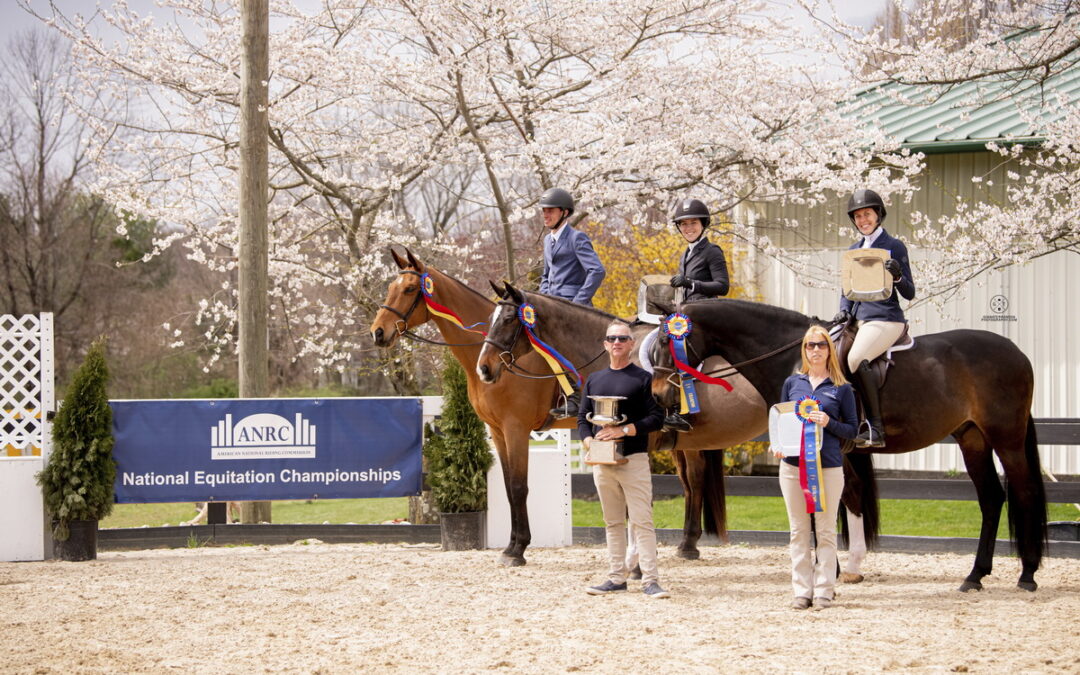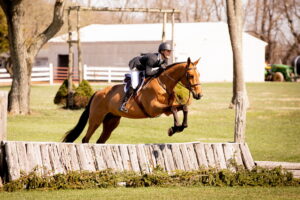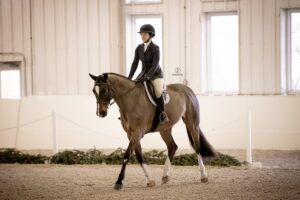You know the ASPCA Maclay, the U.S Equestrian Federation Medal and the USEF Talent Search–they are the equitation finals that get the most publicity.
But what about the American National Riding Commission Championships, which wrapped up last Saturday at the Centenary University Equestrian Center in Long Valley, N.J.? It has a written test component worth 5 percent of an exhibitor’s score, which is unique for a championship. Its three additional phases include a segment presented on a derby field over natural obstacles (30 percent), a “program ride”/flat phase with two jumps (35 percent) and a medal round in a ring (30 percent).
Based on the American forward riding system, the ANRC tournament offers an all-around test that goes deeper than the way a rider looks on a horse and meets the fences. Its roots are in the teaching of Capt. Vladimir Littauer, a Russian emigre, cavalry school veteran and author. U.S. Olympic show jumping gold medalists Bill Steinkraus and Joe Fargis are among the prominent riders who have been influenced by Littauer. The list also includes Bernie Traurig, winner of both the AHSA Medal (as it was called before the current century) and ASPCA Maclay.
He was a mentor of Paul Cronin, the former director of riding at Sweet Briar College in Virginia, who carried on his work and theories, writing what is in effect an update of Littauer’s 1951 classic, “Common Sense Horsemanship.” His consequential 2004 volume is “Schooling and Riding the Sporthorse: A Modern American Hunter Jumper System.”
Centenary had a big victory in the meet, as its national collegiate team won for the first time since 2016. Savannah College of Art and Design (SCAD), which had won every ANRC national championship since then, took second place with one of the of the two teams it fielded at the national level during the championship. Centenary’s novice collegiate team finished second overall in its division.
“I appreciate this competition because it has the four different phases. I feel it encompasses not only good riding but also good horsemanship,” said Kelly Munz, chair of Centenary’s department of equine studies.
The judges, Scott Hofstetter and Lynn Caristo Forgione, are nationally recognized and top class. Courses were designed by Tim Cleary, a Centenary faculty member.
Unlike the Intercollegiate Horse Shows Association competition, where catch-riding is part of the test, ANRC competitors can ride their own horses, or horses they have ridden over a period of time.
Each of Centenary’s three national team members spent about a month with the horses they rode in the competitions, being involved in their care as well as riding them.
In contrast to what happens with IHSA, “It’s much more of a partnership,” said Tara Clausen, who has coached the ANRC team with Michael Dowling for 20 years, is a director at large for ANRC and also served as meet director for the show.
“It goes right back to what we’re teaching in the classroom,” said Tara, noting the fact that both Centenary’s national and novice teams won the written phase “is pretty special to us. It shows the payoff of the academic side of our program. As we progress through the week through the other phases, it demonstrates our basis in developing effective riders.”
Those selected for the ANRC team are what she and Michael believe are “our top riders at this level. This competition exemplifies the true training and riding partnership that someone who might be stepping out as professional might be very well-skilled in.”
The written test involved questions on health and first aid, in addition to theory about forward riding from ANRC, such as use of the aids. Forward riding has a lot of basics in stabilization of the horse, or balance, according to Tara, who also coaches Centenary’s hunter/jumper team.
“It’s a progression, very much about having the horses be relaxed and stabilized and happy in their jobs. It focuses more on the quality of the horse’s way of going and their level of relaxation, versus just getting to the ribbons.”
Michael said it involves having a lighter seat going to the jumps, riding a balanced horse in self-carriage, cantering horses up and downhill.
“In the equitation world, where do you get a chance to ride outside of a ring?” he asked, noting there are only a couple of major shows where that happens.
“For college kids who may not get to that level, it’s so unique and special.”
Sophomore Benjamin Hoban, 20, of Webster, N.Y., who rode on the winning national squad with Haylie Kerstetter and Morgan Munz, Kelly Munz’ daughter, called ANRC “a super-cool experience. The derby phase is awesome, super fun.”
The horse to which he was assigned, Qirius, became his focus as he clipped, bathed and groomed him to get him looking sharp for the competition. A junior hunter rider who had competed at the National Horse Show in that division, and also has ridden in junior equitation, he noted ANRC was a completely different type of experience.
“I like the aspect that you’re selected to represent your school. It makes the riding, which traditionally is an individual sport, a team sport. It was a great feeling to bring it home to the school. It was a fun group of people to do it with.”
Haylie rode and took care of Houdini, a Hanoverian who is her favorite in the Centenary string.
“The horses were completely our responsibility, grooming and conditioning them. It was really nice to spend all that time with him getting him ready for the competition, physically and mentally,” said Haylie, who comes from Coatesville, Pa.
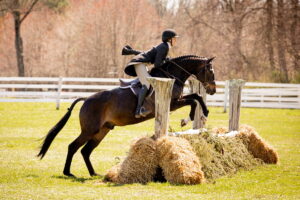
Haylie Kerstetter on Houdini. (Photo by Giana Terranova Photography)
The 21-year-old co-captain of Centenary’s hunter/jumper team will graduate in May and already is applying for jobs as an assistant trainer. She thinks being part of the team will help her with that and branching into marketing as well.
“It looks really good (on a resume) because people understand it’s not just a riding competition. It shows you’re a little more well-rounded than just getting on and jumping one course and winning one class,” said Haylie. She didn’t do the big eq prior to college, when she rode on the local circuit had a mixed breed horse “the kind of horse you could do anything with.”
Haylie noted how special it is that all the horses have been donated to Centenary.
“It’s really awesome that people trust us with these horses. They’re such amazing quality and they go to the show and look amazing next to these horses leased from a show barn. We’re really grateful.”
Morgan rode Assured, who was donated via top hunter rider Amanda Steege. In preparation for the competition, “there definitely was a lot of extra time in the saddle,” she noted.
There also was a lot of extra time focusing on preparing for the written segment.
“We definitely had to study the week before and the week of,” she said.
She was impressed about the championships when she realized how many riders she knows once were a part of it.
“Researching it when I was preparing for the competition, you look online at all these people I see in the real world, and I’m like,`Oh they did ANRC.’
“I liked the emphasis on the people who created forward riding and going back to the roots of all of that, and why ANRC was founded,” said Morgan.
“It has a specific goal of encouraging forward riding and soft riding, being a partner with your horse.”
The 20-year-old junior someday would like her own business involved with training and sales horses.
Coach Michael is a fan of the derby phase, noting “it’s a little old school. Our kids don’t really have an opportunity as junior riders to ride on uneven terrain; they don’t understand the concept of cantering up the hill or balancing down the hill or jumping off a bank. I always feel excited when I see the kids go out there and have a great time. I think that’s really an ultimate test. The intent is that they’ve prepared these horses to be balanced.
“There’s a purpose to the sequence of these phases, hoping that on the final day we’ve prepared them well for the medal (phase). It’s fun for our college kids because it’s not the same old catch riding. I love it as a trainer, the program ride is really conducive to setting them up for good stuff. The more you teach the philosophy and the system, the more it makes sense. It puts everything in an order.”
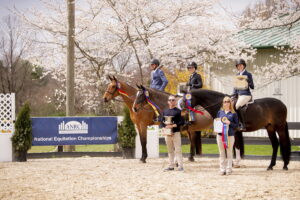
The Centenary winning national team of Benjamin Hoban, Morgan Munz and Haylie Kerstetter with coaches Michael Dowling and Tara Clausen. (Photo by Giana Terranova Photography)
The competition was “a real even playing field,” Michael pointed out, because the home team did not have the advantage of being able to school on the derby field after snow and rain had made it too wet to ride on until the weekend of the competition.
Kelly noted the national victory is “very exciting for us or any school that has an equine studies program when our students do well both on the riding and written phase, because we’re trying to produce professionals who are well-rounded. So it’s an acknowledgement of the good work that we’re all doing as schools.”
Centenary, which won the zone and regional competitions for IHSA, now gears up for that organization’s finals May 5-8 in Harrisburg, Pa.

